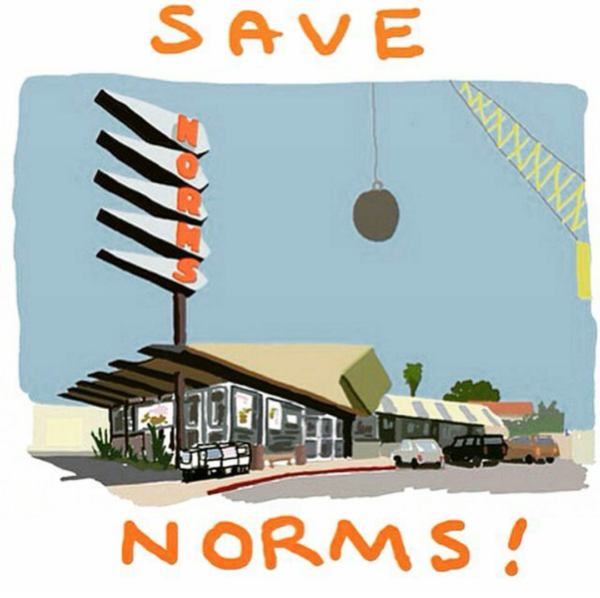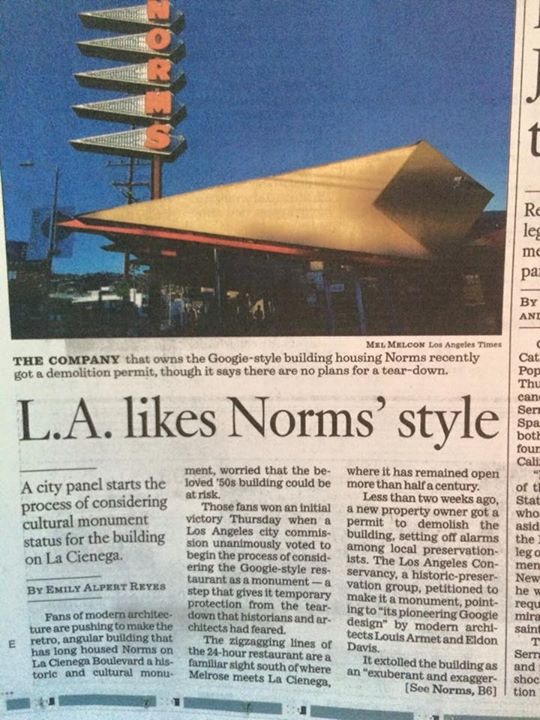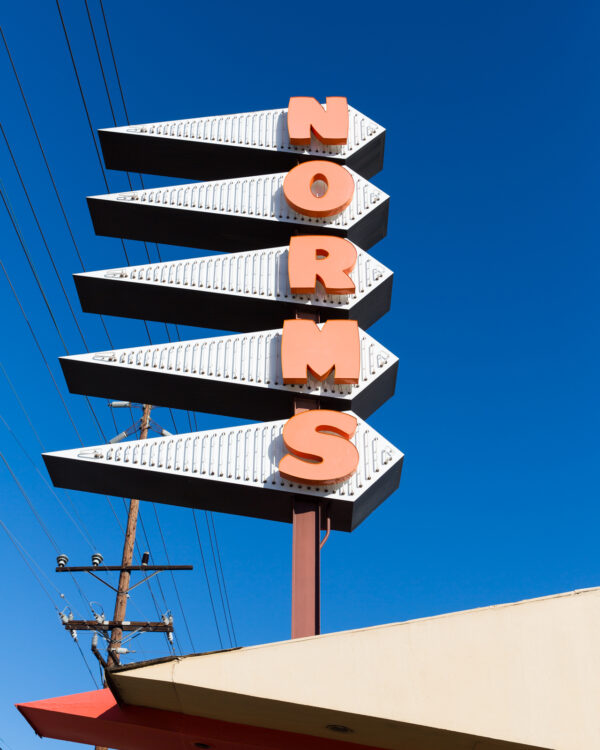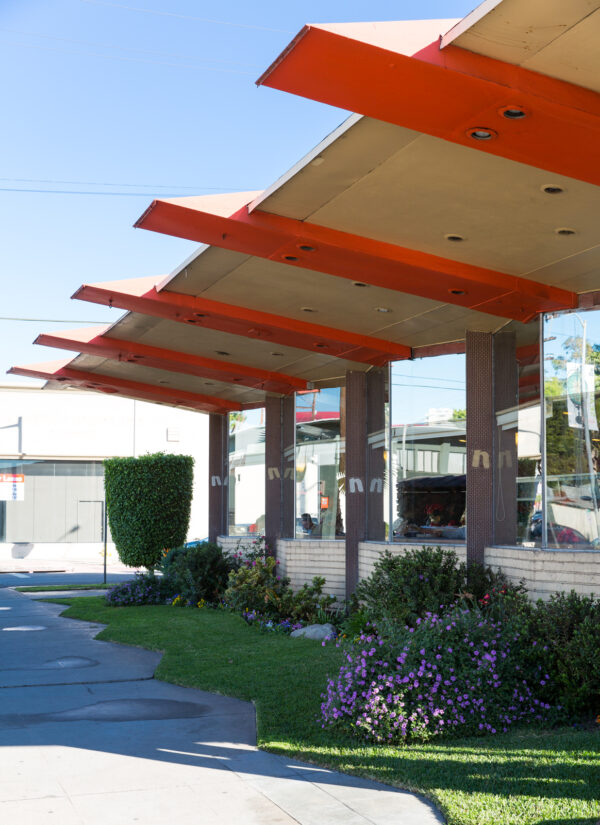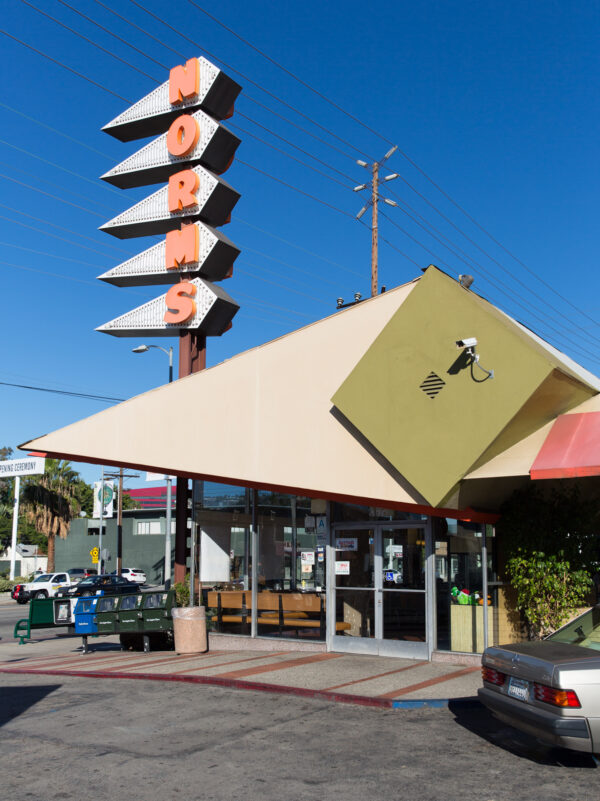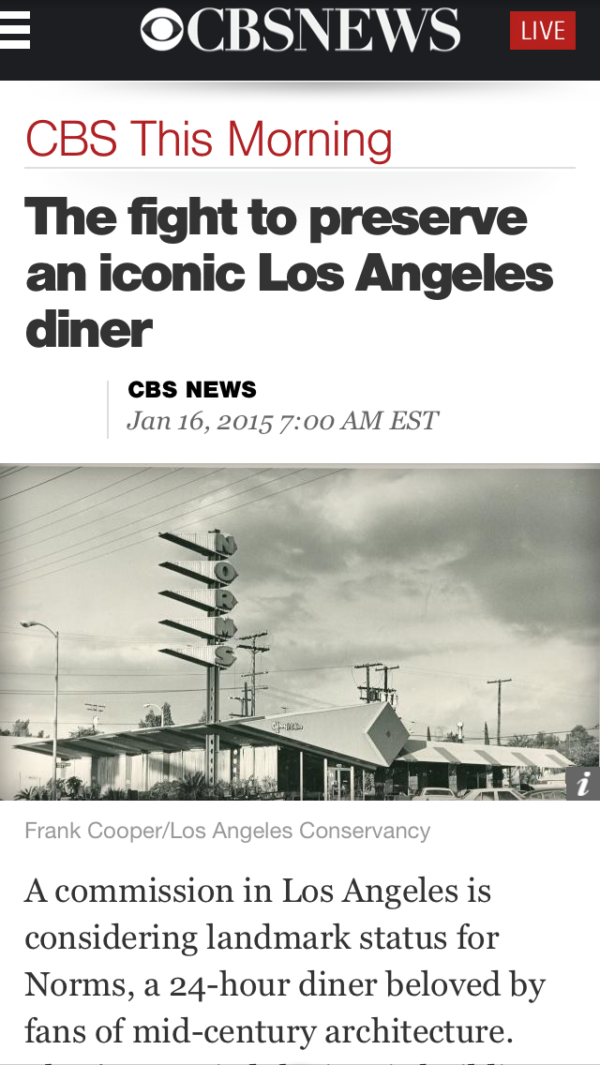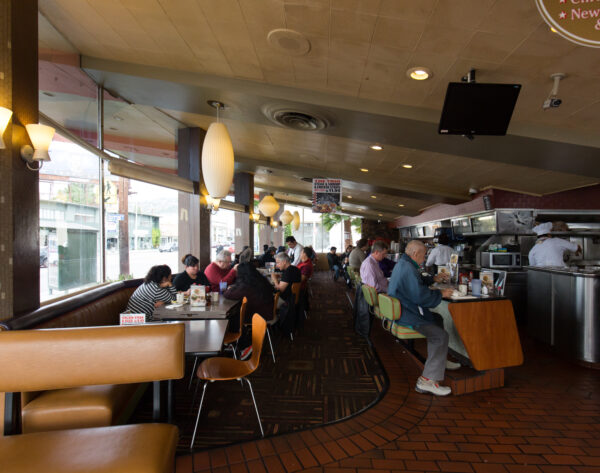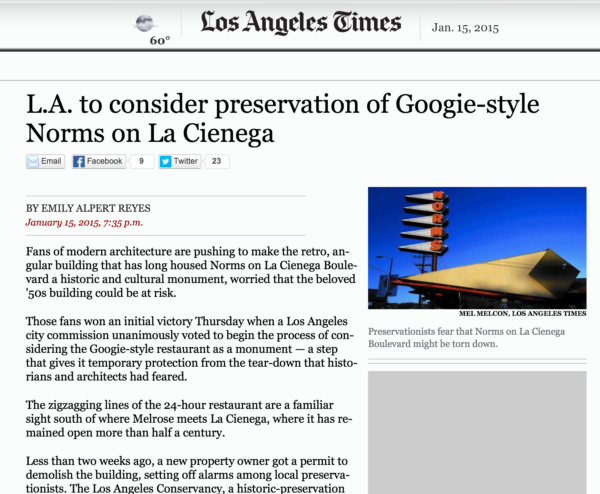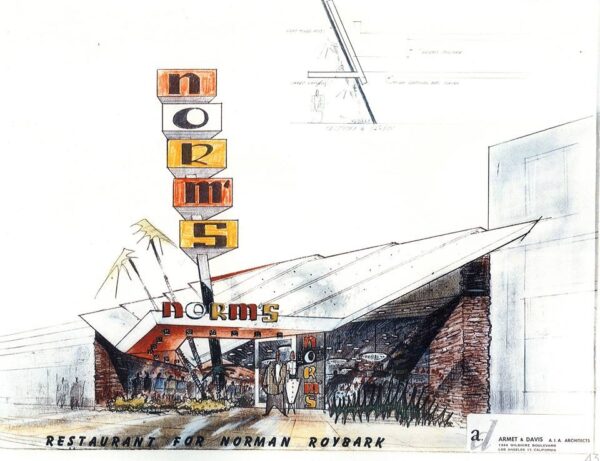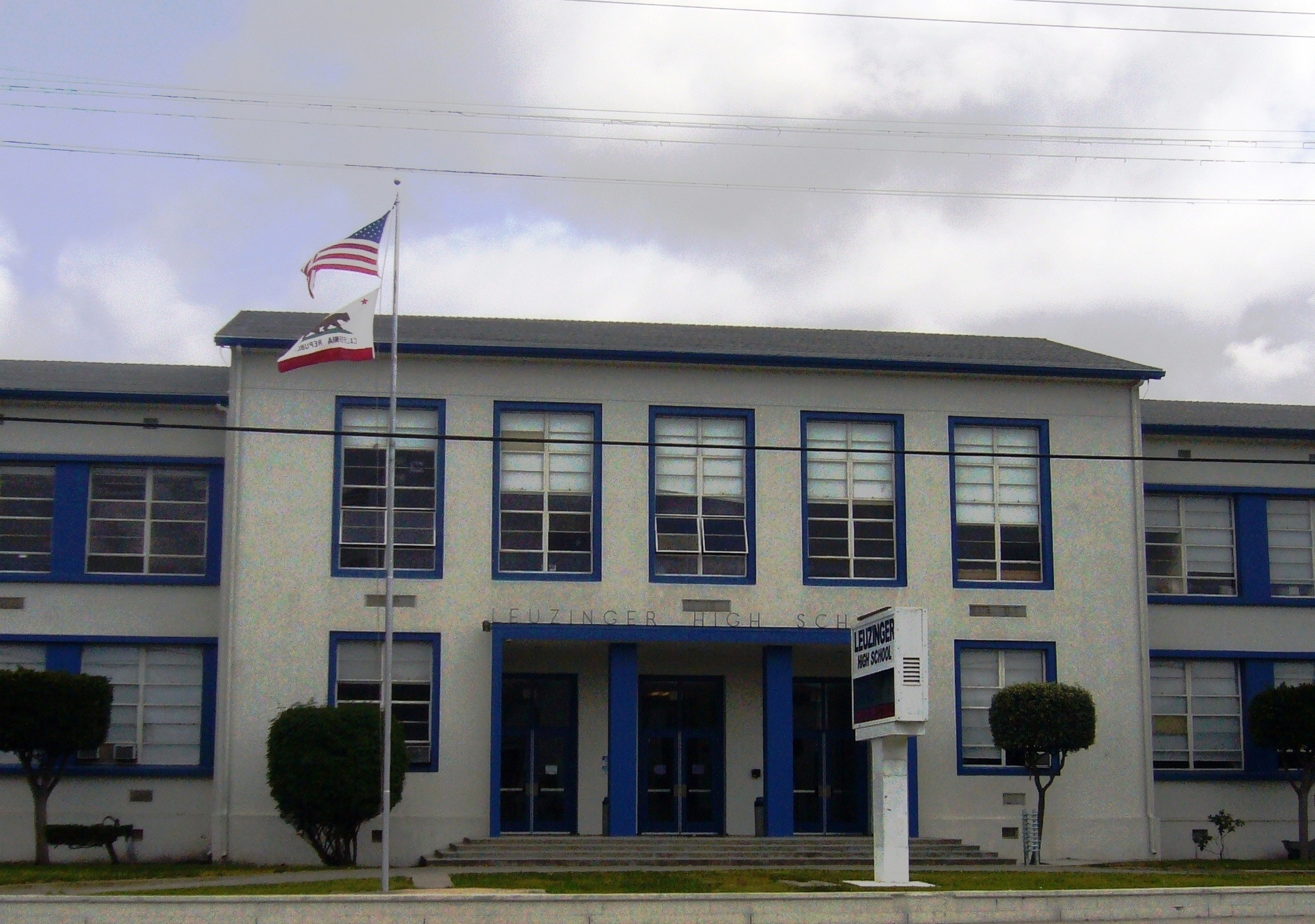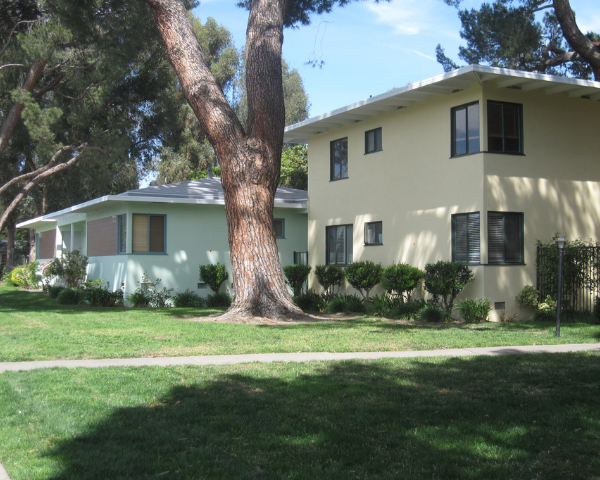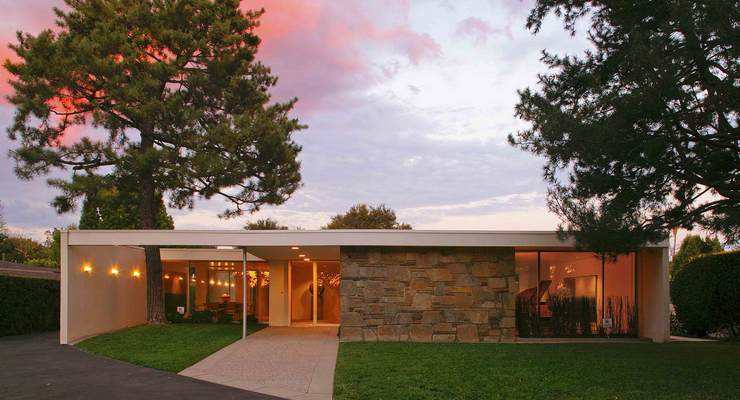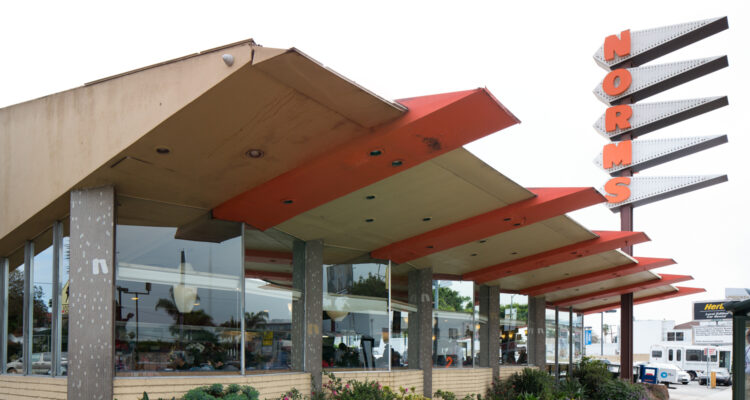
Place
Norms La Cienega Coffee Shop
Among the most exuberant and exaggerated Googie designs in the nation, the 1957 Norms is a rare remaining example of the California coffee shop type.
Active
On December 5, fast casual chain Raising Cane’s will present their plans to occupy and preserve the historic Googie structure to the Cultural Heritage Commission.
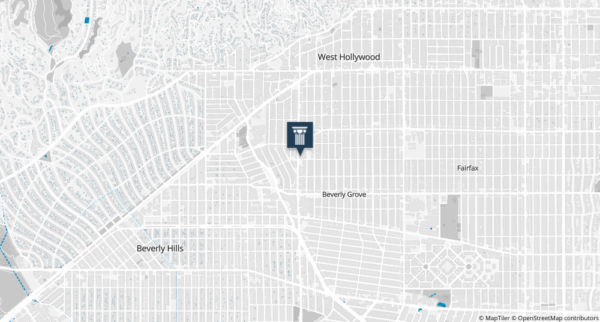
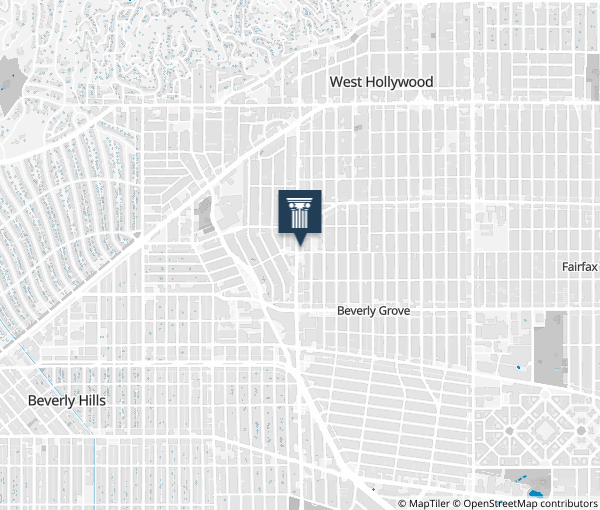
Place Details
Address
Architects
Decade
Designation
Property Type
Government Officials
Attributes
Community
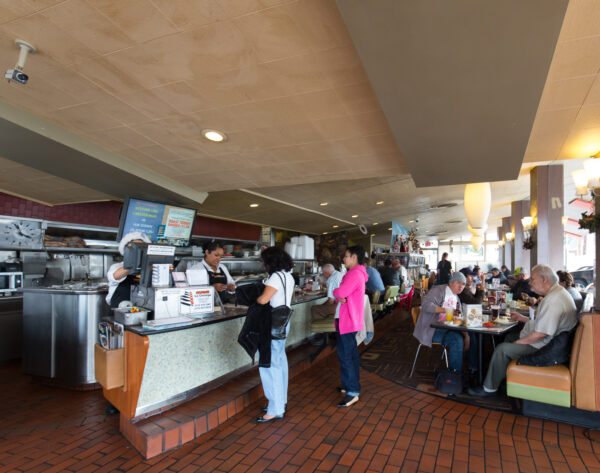
Norms La Cienega, 2014 | Photo by Hunter Kerhart
Overview
Lovers of Googie architecture always cite Norms La Cienega as a stellar example of the style, and with good reason: it is among the most imaginative Googie designs in the nation. Spectrum News1 features Norms in this November 2021 piece, “Norms restaurant, an LA landmark, lasting example of Googie architecture.”
Los Angeles native Norm Roybark opened the first Norms restaurant in 1949, expanding to the now-famous La Cienega location in 1957. His restaurant chain grew to become a regional icon, with eighteen locations across Southern California, all flying the space-age, motorist-oriented Googie flag to some degree. Be sure to check out “After 70 Years, the Norms Chain of Iconic Googie Diners Looks to the Future” in Los Angeles Magazine.
Designed by influential modern architects Louis Armet and Eldon Davis and completed in 1957, Norms La Cienega is an exuberant example of the California coffee shop type and an expressive Googie masterwork. In his assessment of the building, architect James Black summed up the building’s exuberance:
“Everything that isn’t zigging can safely be assumed to be zagging.”
When asked about the enduring appeal of Armet & Davis designs, Davis demurred, “We would have liked to have made them more aesthetic, but we were just designing them to sell hamburgers.”
For nearly seventy years, Norms La Cienega Coffee Shop has been the dynamic flagship location of the Norms restaurant chain and an icon of Mid-Century Modernism. Its car-friendly design and bold Googie architecture represent a period of growth and optimism in Los Angeles history.
Once widespread in Los Angeles, approximately eight Googie coffee shop restaurants remain in the city today.
The Norms restaurant chain dates back to 1949, when owner Norman Roybark opened the first location at Sunset and Vine. The business remained in the family for three generations and was sold in late 2014. The Roybark family sold the Norms chain to CEO Jim Balis and President Mike Colonna, hospitality veterans whose credits include Dunkin’ Donuts, Chili’s, and Boston Market. According to a statement from the family, “the new owners were carefully selected to protect the legacy of Norms.”
About This Place
About This Place
Architects Louis Armet and Eldon Davis, who were best known for their postwar Googie architecture, were responsible for Norms La Cienega, as well as myriad other Norms locations. The project’s structural engineer, Richard Bradshaw, worked on a number of iconic L.A. structures, including the Theme Building at LAX.
Armet & Davis’ La Cienega design included a monumental “saw tooth pennant” neon sign spelling out N-O-R-M-S to capture the attention of drivers and would-be diners. The sign echoed the building’s bold diamond-shaped roofline, and the architects repeated these playful geometric motifs throughout the diner.
Landscaping was an integral part of this modern California design. Subtropical plantings were installed at the building’s perimeter, easily visible to diners inside through the sleek glass walls. This juxtaposition created the effect of dining on an outdoor patio.
Pioneering Chinese American architect Helen Fong, who worked for Armet & Davis, designed many of the interior elements.
The recommendation to hire Armet & Davis came from restaurant kitchen equipment designer Stan Abrams. Abrams collaborated with the architects to integrate the kitchen seamlessly into the restaurant. As a dealer of modern furniture, Abrams also advised the use of the wire chairs designed by Charles and Ray Eames. Because owner Norman Roybark envisioned a chain of restaurants, he sought a unified design with a distinctive image or brand that could be repeated in each restaurant site as a form of advertising.
Armet & Davis designed a total of eight Norms restaurants, including locations in Los Angeles, Culver City, Hawthorne, Huntington Park, Long Beach, and Inglewood. The duo also designed the popular Johnie’s Coffee Shop on Miracle Mile.
Norms La Cienega’s car-friendly design and distinctive modern architecture represent a period of growth and technological optimism in Los Angeles history.
L.A. Googie Coffee Shops
From 1945 to 1965, the California coffee shop, a new restaurant type and architectural style, developed in Southern California in response to the return of prosperity after World War II, rapid population growth, and the rise of the suburbs. Compared with the diners and drive-ins of the pre-war era, the California coffee shop was larger and more comfortable, yet still reasonably priced. It featured indoor seating, expansive menus, and stylish contemporary designs.
The Norms chain emerged as the benefits and look of modernism were becoming more and more accessible to the average citizen in the buildings of everyday life.
As epitomized by Norms, Armet & Davis were major figures in the popularization of California coffee shops and made significant contributions to the development of the Googie architectural style. Although a number of architects shaped the style’s evolution from the drive-in architecture of the 1920s and ’30s, including John Lautner and A. Quincy Jones, Armet & Davis were the most prolific. The pair designed more than twenty-five Googie-style coffee shops in Los Angeles in the 1950s and ’60s.
In countless ways, Norms La Cienega reveals the deeply innovative spirit of modern architecture and culture in Los Angeles in the middle of the century. The open, flowing plan and large glass window walls reflect modernism’s rejection of the traditional box and its interest in blending indoor and outdoor spaces. Its creative spacial configuration, modern engineering, and cutting-edge materials (plastics, stainless steel, formica, etc.) further embody the style and period.
With repeated geometric details reinforcing the chain’s modern brand identity, Norms La Cienega represents Armet & Davis’ first attempt to use architecture as a means of establishing a recognizable brand, a practice that would become a standard of the restaurant industry. Norms was also one of the first California chains to apply the branding concept to a larger, sit-down restaurant. The function of advertising was directly integrated into the building’s design, from the bold neon sign that echoed the shape of the roof, to the well-lit glass walls that put the activity of the restaurant on view to passing motorists.
Our Position
UPDATE
On December 5, Raising Cane’s will present their plans to occupy the historic building while restoring some historic features. The Conservancy was able to review these changes ahead of the hearing, but encourage all interested to tune in and learn more.
In December 2014, the Conservancy and our Modern Committee nominated Norms La Cienega for designation as a local landmark (Historic-Cultural Monument, or HCM) for its association with the firm of Armet & Davis, its pioneering Googie design, and its enduring significance in Los Angeles’ postwar landscape. Landmark designation gives the building strong protection from demolition and inappropriate alterations.
The nomination was prepared by architect and historian Alan Hess, whose books Googie and Googie Redux are considered the seminal guides on Googie and California coffee shop architecture. Hess also wrote the essay Everyday Modernism, featured on our Curating the City: Modern Architecture microsite, as well as the successful Historic-Cultural Monument (HCM) nomination for Johnie’s Coffee Shop. The Conservancy will honor Alan Hess with our President’s Award at our 34th Annual Preservation Awards Luncheon on May 7.
On Wednesday, May 20, 2015, the Los Angeles City Council voted unanimously to designate Norms La Cienega as an Historic-Cultural Monument (HCM). During the meeting, then-Councilmember Paul Koretz praised the Googie icon as “a home away from home for many people” and the kind of place that is “not just culturally significant, but culturally uniting.”
The Conservancy thanks then-Councilmember Koretz for his leadership in this effort and his continued commitment to preserving this highly significant building, as well as everyone who wrote in support of the nomination.
I made [Mad Men] with one agenda early on: Stop tearing stuff down. You’re gonna miss it. — Matthew Weiner, creator of Mad Men
In March 2015, Councilmember Koretz held an impromptu press conference at Norms La Cienega. He was joined by Linda Dishman, the Conservancy’s then-executive director; Matthew Weiner and actor James Darren, longtime Norms customers; Mike Colonna, president of Norms Restaurants; and Norms staff and regulars. It was a great outpouring of support for this Googie icon and the authentic community it has fostered over nearly seventy years. See Matthew Weiner’s full comments
The event celebrated the Los Angeles Cultural Heritage Commission’s unanimous vote the previous week to recommend HCM designation for Norms La Cienega. Koretz and Colonna spoke in support of designation, and a representative of the property owner said the owner is not opposed to the designation.
Because the building has been designated as an HCM, it will receive more robust protection from demolition and excessive alteration under the City’s Cultural Heritage Ordinance.
The owners of Norms Restaurant actively support designating the building as a Historic-Cultural Monument (see their statement from January 2015).
